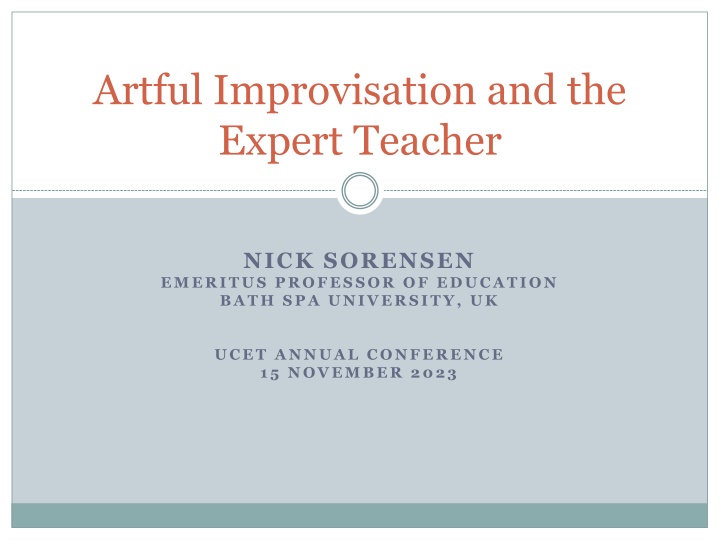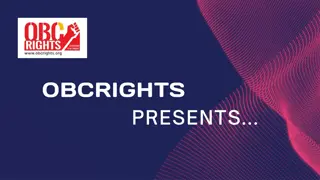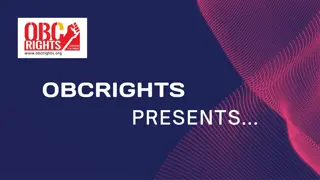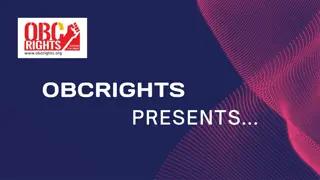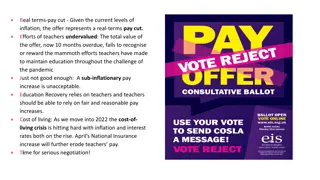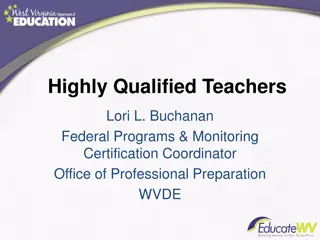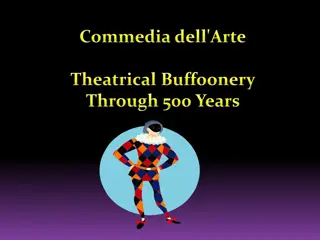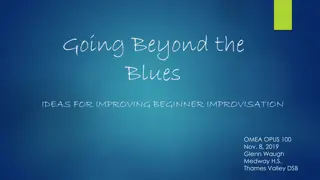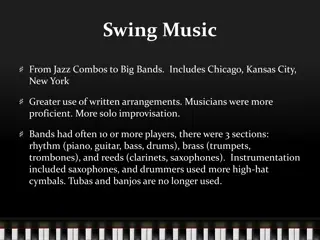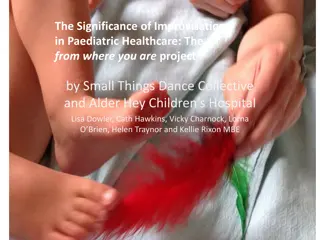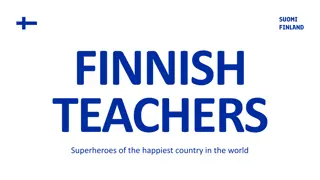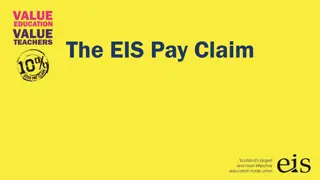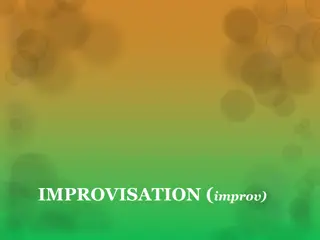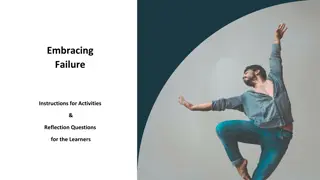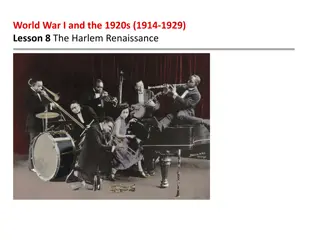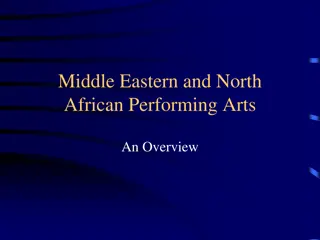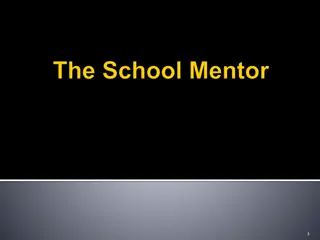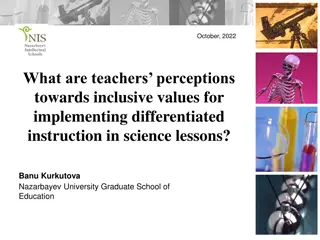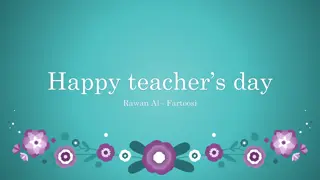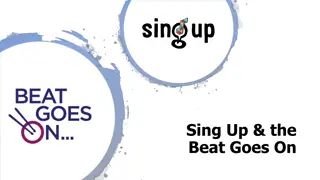Artful Improvisation and Expert Teachers: A Unique Approach
Unveil the power of improvisation in teaching through real-life experiences and working definitions. Explore the artful skills required for successful improvisation, blending knowledge and spontaneity. Discover the essence of professional and educational improvisation perspectives to enhance teaching effectiveness and engage learners in dynamic interactions.
Download Presentation

Please find below an Image/Link to download the presentation.
The content on the website is provided AS IS for your information and personal use only. It may not be sold, licensed, or shared on other websites without obtaining consent from the author.If you encounter any issues during the download, it is possible that the publisher has removed the file from their server.
You are allowed to download the files provided on this website for personal or commercial use, subject to the condition that they are used lawfully. All files are the property of their respective owners.
The content on the website is provided AS IS for your information and personal use only. It may not be sold, licensed, or shared on other websites without obtaining consent from the author.
E N D
Presentation Transcript
Artful Improvisation and the Expert Teacher NICK SORENSEN EMERITUS PROFESSOR OF EDUCATION BATH SPA UNIVERSITY, UK UCET ANNUAL CONFERENCE 15 NOVEMBER 2023
Roisins story I used to plan everything, down to the last minute, and I went into a class one day and, I don t know what it was exactly but the whole group was not in the mood for learning so I just stood up and I literally picked up my printed lesson plan and walked to the bin, dropped it in it and said so what are we going to talk about today? That one little thing scared the life out of me as I realised I would be winging it but I also had trust in myself and it was a brilliant session and they actually ended up learning quite a lot because we just pulled out from what they talked about various bits that I hoped they would learn anyway. It was quite a powerful experience from my perspective and the students.
Improvisation: a working definition Improvisation: is a mode of intentional creative behaviour that can be present in all aspects of life taking place within real time involving spontaneity, intuition and interaction is unpredictable and each improvisation is unique. is the consequence of the dynamic interplay between stability and change. emerges from the dynamic interplay between fixed and emergent structures can be artless or artful
Three perspectives Professional The Improvising Teacher Educational Improvisational
Professional: Quintilian the crown of all our study and the highest reward of our long labours is the power of improvisation. Artless improvisers rely solely on their ingenuity, they may have a natural talent for oral performance but they do not spend time on their studies, they don t make scripts or plan a structure for their scripts. The artful improviser, however, will be skilled in the subject they are speaking about in addition to having a natural talent and being educated in the art of speaking.
The artful improviser Knowledgeable in their subject and of the linguistic means that they could use. The acquisition of a repertoire (copia). Preparation is all-important; having the ability to speak freely, with or without notes, and that a lack of general preparation will inhibit the ability to improvise. Improvisation is required to respond to: mishaps; when examining a witness in a trail, when it is impossible to foresee how the witness will answer; happy incidents, moments within a prepared speech when the speaker suddenly gets new insights.
Improvisational: disposition and skills Permission to improvise Noticing Dialogue Connecting Adapting Adaptation IN and ON action Personalisation
Improvisational skills So what does this story tell us? First of all it tells us that the teacher noticed that the class were not in the mood to respond to the lesson that had been planned I don t know what it was exactly but the whole group was not in the mood for learning . The teacher then responded to what they had noticed. When she placed the prepared lesson plan in the wastepaper bin she clearly demonstrated to the class that this was going to be a different kind of lesson to the one they were expecting, she was adapting to the given circumstances and demonstrating this to the class. Asking the question so what are we going to talk about today? opened up a dialogue with the students. The teacher knew she was taking a risk. That one little thing scared the life out of me as I realised I would be winging it . However she realised that she also had trust in myself , a trust that was based on her experience and expertise as a teacher. This trust enabled her to give herself permission to improvise. So, as a consequence of taking this risk it was a brilliant session and they actually ended up learning quite a lot because we just pulled out from what they talked about various bits that I hoped they would learn anyway . The teacher was able to make connections between what the students talked about and what she wanted them to learn anyway.
Biesta (2015) some conclusions Teaching necessarily requires improvisation (a social / relational activity) Educational improvisation: the capacity for embodied judgment About the how (craft) About the what for (wisdom) What disciplines improvisation in teaching is orientation on the purpose of education Orientating one s action towards the unforeseen (See also Biesta, G. (2015) The Beautiful Risk of Education; chapter 7 Virtuosity . London: Paradigm)
The formation of The Improvising Teacher Promote artful improvisation Foreground the necessity of having a disposition to improvise Develop the four improvisational skills Attend to developing the whole professional: holistic What is educationally desirable? Constant practicing of educational judgment (from Day 1): embodied Study the virtuosity of others (or absence of it) Master classes, interviews with retired teachers, literature, film
6 takeaways for UCET Concept of The Improvising Teacher supports UCET s vision for high quality teacher education Acknowledges the unique contexts in which high quality teaching takes place Empowers professionalism and agency of teachers Supports the development of healthy learning environments Promotes teaching (and teacher education) as a collective, co-constructed endeavour Contributes to the development of competent, confident and ethical professionals.
https://nicksorensen.org Sorensen, N. (2023) The Improvising Teacher: Reconceptualising Pedagogy, Expertise and Professionalism. London: Routledge.
